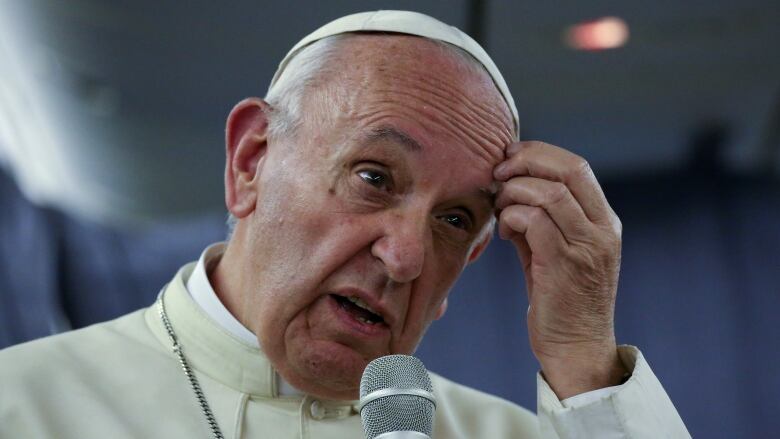N.W.T. survivors of residential school still wait for apology after Pope declines to offer one
‘We never asked him for a personal apology. We asked him to apologize on behalf of the Catholic church’

Residential school survivors looking for an apology from Pope Francis won't be getting one for now. That leaves some survivors in the Northwest Territories disappointed.
"They are not owning up to the horrific role they played and it's shameful," said Stephen Kakfwi, former president of the Dene Nation and former premier of the Northwest Territories.
He said reconciliation isn't possible without an apology from the Catholic Church. "We can't have reconciliation until they own up to their role in the abuse that was heaped on many, many, many children."
In May 2017 Prime Minister Justin Trudeau requested an apology from the Pope in regards to the 58th call to action from the Truth and Reconciliation Commission of Canada. But a letter from the Canadian Conference of Catholic Bishops on Tuesday said the Pope "felt that he could not personally respond."
Kakfwi isn't satisfied with that answer.
"We never asked him for a personal apology. We asked him to apologize on behalf of the Catholic church."
'An apology is just words'
Jon Hansen, the new Bishop of the Diocese of Mackenzie-Fort Smith, said he isn't sure why the Pope chose not to apologize. But he said it might be because "there's a feeling that there have been many apologies already from our church leaders."
He said he thinks the Pope is trying to send a message to Canadian bishops: "An apology is just words. And what he wants to see is the bishops fully engaged in the question of reconciliation."

Hansen said Canadian bishops are looking at ways to best respond to the 94 calls to action of the Truth and Reconciliation Commission. Hansen pointed to a 2009 expression of sorrow from Pope Benedict XVI as one of the previous apologies to Indigenous peoples.
But Paul Andrew, former CBC journalist and residential school survivor, said he doesn't want pity — he wants an apology.
Andrew said that offering an apology would be a way to welcome back former members of the Catholic Church, like himself.
"I feel like the Pope had a chance to build a new relationship with former students," Andrews said.
He said these apologies are important. He still remembers his experience when Stephen Harper apologized in 2008. "I remember thinking — this man is talking to me. He's saying we did this to you and I'm sorry."
Kakfwi said Indigenous leaders should get together and give a handwritten invitation to Pope Francis. He wants to invite the Pope to come to Canada, with the expectation that he will offer an apology.